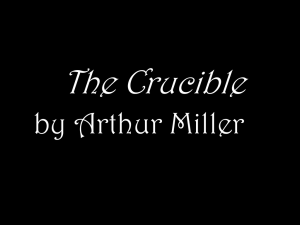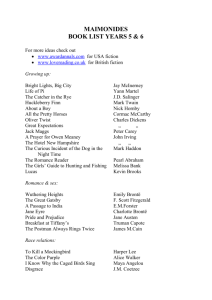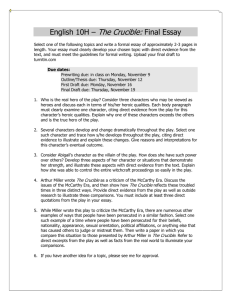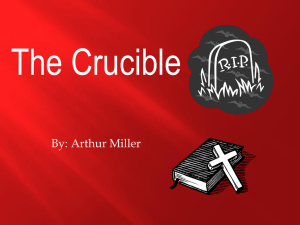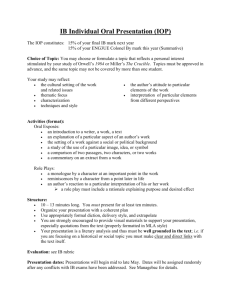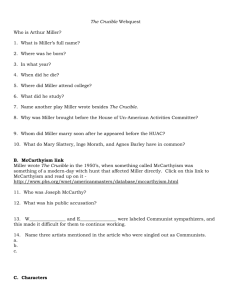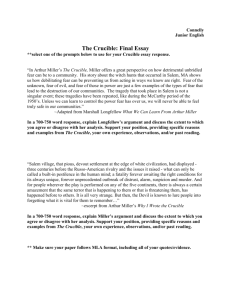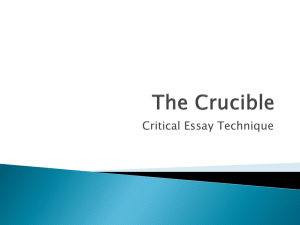Research Paper Outline
advertisement
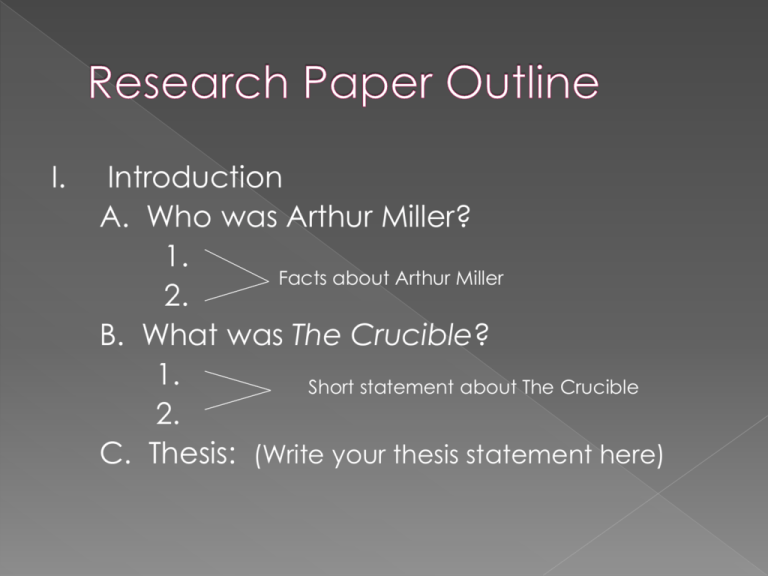
I. Introduction A. Who was Arthur Miller? 1. Facts about Arthur Miller 2. B. What was The Crucible? 1. Short statement about The Crucible 2. C. Thesis: (Write your thesis statement here) II. Body Paragraph 1 A. Topic Sentence: Explain who Sen. McCarthy is 1. 2. (and on and on. . . .) B. Define Communism, Red Scare, list events of the Red Scare and the McCarthy Trials 1. 2. (and on and on. . . .)—this may go all the way to 10 or more! C. What caused Miller to be so frustrated? 1. 2. (and on and on. . . .) D. Concluding Sentence: something about Miller’s frustration causing him to write the play (Don’t forget to include quotes or direct wording for parenthetical documentation!) While the Works Cited page indicates what sources you have used, parenthetical documentation in the body of your paper indicates what specific information you have borrowed from someone else’s work. This information includes quotations, paraphrases, summaries, and facts and ideas that are not common knowledge. If you do not document your use of borrowed material, you are committing plagiarism -- stealing the ideas of someone else and presenting them as your own. Place the parenthetical documentation as close to the borrowed material as you can. If you are quoting, place the documentation at the end of the quotation, after the quotation mark but before the end punctuation. Each instance of documentation in the body of your paper must link directly to an entry on the Works Cited page. Keep the parenthetical reference brief. Here are a few guidelines: Most parenthetical references will consist of author and page: (Wharton 235) If you refer to the author in a preceding sentence, you need only provide the page: (235) If all of your references come from a single work (as when you write a paper for English), you need only provide the page number, provided that you mention the author and title at the beginning of the paper. If the source has no author, provide a short version of the title:(“Cloning” 2) If the source is from an encyclopedia or another similar source that relies on alphabetical order, no page number is necessary. If you are documenting a Web page, page numbers are not usually necessary, since they will vary from printer to printer. Document the author or title. (Sometimes you have to look carefully to locate the author of a Web page, if there is an author at all.) Do not use the URL in the cite. Direct Quote: The modern world requires both the ability to concentrate on one thing and the ability to attend to more than one thing at a time: "Ideally, each individual would cultivate a repertoire of styles of attention, appropriate to different situations, and would learn how to embed activities and types of attention one within another" (Bateson). Cited information (word for word) that’s not a direct quote: The use of Customer Relationship Management systems has grown substantially over the past five years as companies attempt to adapt to customer needs and to improve their profitability ("Making CRM Work"). III. Body Paragraph 2 A. Topic Sentence: (something about the parallels of McCarthyism and The Crucible) B. Draw your first parallel 1. Further explanation 2. Further explanation (and more if needed) C. Draw your second parallel 1. Further explanation 2. Further explanation (and more if needed) D. Concluding Sentence: (something about Miller using the Crucible to parallel to open the public’s eyes—or whatever reason you researched) IV. Body Paragraph 3 A. Topic Sentence: (Something about reactions of people during these trials) B. First explanation of reactions 1. Details 2. Details C. Second explanation of reactions 1. Details 2. Details D. Concluding Sentence: (Something about the reactions/results and the outcome) V. Conclusion A. Restate your thesis. B. C. Give opinions, summarize, more facts D. This is a listing of only the sources you used as parenthetical documentations— NOT ALL YOUR SOURCES!!!!!! Rules for Works Cite Page › Alphabetize › Don’t number the sources › Double space every line—never use more than a double space › Reverse indent Works Cited “McCarthyism”. Encylopedia Britannica On-line. 2010. Web. 29 Oct. 2013. Smith, Jane. “The Salem Witchcraft Trials of 1692.” 7 Mar. 2008. Web. 30 Oct. 2013. Works Cited Smith 5 Smith, George. “McCarthyism: Fact or Fiction?” Senator Joseph McCarthy on the Web. June 2009. Web. 30 Oct. 2010. Gould, Stephen. “The Life and Times of Arthur Miller”. 10 September 2009. Web. 31 Oct. 2010. “Beyond Miller’s Imagination”. 2005. Web. 29 Oct. 2010. Works Cited Smith 5 1. “Beyond Miller’s Imagination”. 2005. Web. 29 Oct. 2010. 2. Gould, Stephen. “The Life and Times of Arthur Miller”. 10 Sept. 2009. Web. 31 Oct. 2010. 3. Smith, George. “McCarthyism: Fact or Fiction?” Senator Joseph McCarthy on the Web. June 2009. Web. 30 Oct. 2010. Works Cited Smith 5 “Beyond Miller’s Imagination”. 2005. Web. 29 Oct. 2010. Gould, Stephen. “The Life and Times of Arthur Miller”. 10 Sept. 2009. Web. 31 Oct. 2010. Smith, George. “McCarthyism: Fact or Fiction?” Senator Joseph McCarthy on the Web. June 2009. Web. 30 Oct. 2010, Works Cited “Beyond Miller’s Imagination”. 2005. Web. 29 Oct. 2010. Gould, Stephen. “The Life and Times of Arthur Miller”. 10 Sept. 2009. Web. 31 Oct. 2010. Smith, George. “McCarthyism: Fact or Fiction?” Senator Joseph McCarthy on the Web. June 2009. Web. 30 Oct. 2010. Smith 5 Use MLA format › Double space › MLA heading (see next slide) › Number each page (1/2 inch from top right) › 1 inch margins all the way around › Title the paper Smith 1 Pete Smith Mrs. Lehew English III 19 November 2013 Trials That Changed History A hero is defined as a person of distinguished courage or ability, admired for his brave deeds and noble qualities. This definition fits Arthur Miller. Miller was born. . . Smith 2 when Senator McCarthy began to accuse Others for fear of spreading communism. These accusations lead to hysteria, causing Many people to fear friends, neighbors, and even family members. Smith 5 Works Cited “McCarthyism”. Encyclopedia Britannica On-line. 2010. Web. 29 Oct. 2010.
